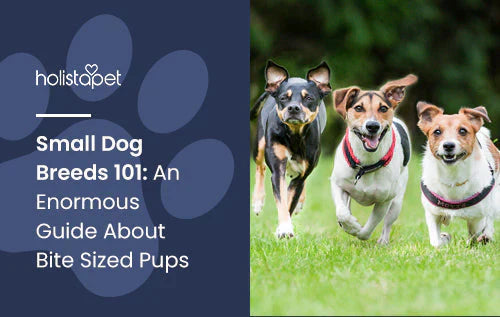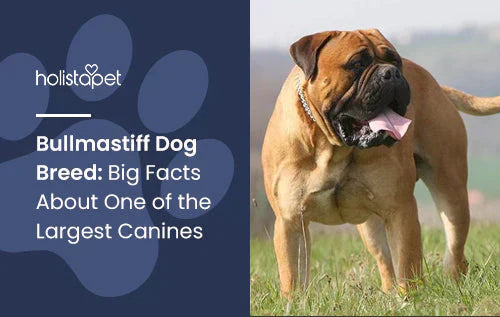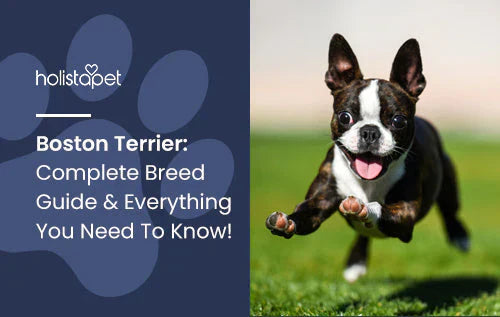Whether you're looking for a rambunctious and lively dog or a quiet and calm pup, small dog breeds might be suitable for your living situation and lifestyle. When it comes to small breeds, there are plenty! From the loud and vibrant Chihuahua to the reserved and loyal Bichon Frise - each is unique, loving, and bite-sized! Here are the small dog breeds that fit best in your specific lifestyle, whether you live with younger kids or have a small apartment in a big city!
Are Small Breeds Good For First-Time Pet Parents?
Smaller dog breeds are not better or worse for first-time pet parents than bigger dogs. A small sized dog may be better for you based on your specific living situation and experience. For example, if you live in a smaller apartment or don't have as much time to clean up the fur of a bigger pup. Smaller dogs also require less food if you are on a tighter budget.
But this doesn't mean that types of dogs small are easier to care for! A lot of smaller dog breeds have more stubborn or complex personalities. This can lead to training that can be more challenging and behavioral issues that are more common with small dog breeds.
Are Small Dog Breeds Easy To Care For?
Often, the care requirements for small dogs still vary from breed to breed. A lot of people believe that small dogs are easier to care for because they require less exercise. But no matter the size of the dog, it's recommended that you let your dog exercise 30 minutes to 2 hours a day. However, there are some small breeds that shouldn't exercise as often due to health concerns.
This includes breeds like the Pug and French Bulldog, which often have breathing complications and issues due to the shape of their noses. But this means more vet visits and more care, including washing their face wrinkles and keeping a close eye on the temperature of your home. Some dog types small shed less and require less grooming due to their small sized dog breeds. There are some breeds, like the Lhasa Apso, that have longer fur that needs special attention if you don't want their coat to get knotted or matted.

The Shih Tzu is another small dog often taken to the groomer or frequently brushed to ensure their coat is styled correctly. In general, it all comes down to specific breeds and their requirements. Some small dogs have easygoing personalities and are pretty low maintenance. But other small dogs have stubborn personalities and require more care to keep them healthy and behaving properly. But smaller dog breeds are generally better for people with less living space who don't want to spend as much on food.
What Is The Easiest Small Dog To Take Care Of?
The Dachshund is often found on lists of low-maintenance dog breeds. This small, long-bodied dog is known to be a bit stubborn, but they are loving and even-tempered. It's important that you don't let your Dachshund jump onto the couch or bed. A lot of people install ramps to avoid their Doxie's back getting injured. They will also carry them up and down the stairs.
Aside from this, the Dachshund doesn't have care requirements that differ too much from other low-maintenance dog breeds. They need high-quality food, fresh water, plenty of love/affection, and very minimal grooming. Remember to brush their teeth and trim their nails when needed. You should also schedule regular vet appointments to make sure your Dachshund is healthy and happy.
Most Popular Breeds
There are a surprising amount of breeds to choose from that all have very distinct personalities, appearances, and other traits and requirements. Simply put, there is a dog for everyone! Here are some popular small dog breeds with a wide variety of personalities and care requirements.
Shiba Inu
This ancient Japanese breed was introduced to America in the 1950s. Their distinctive smiling faces, small pointy ears, bright orange and white coloring, and curled tail make them quite popular. Shiba Inu dogs are confident, loyal, energetic, and protective.

While the Shiba Inu is a very fearless and loving companion, it's also a bit stubborn. They are often suspicious of strangers and can get a bit territorial of their family and yard. Sometimes they can be a little possessive of their toys and food as well. But the Shiba Inu can overcome a lot of these behavioral issues with obedience training at a young age.
Border Terrier
This is one of the oldest British terrier breeds, first bred for protecting sheep from predators. The Border Terrier is a highly energetic dog that's easy to train due to its willingness to please its family. Border Terriers are obedient and vigilant watchdogs with an even temper. This dog is also great with kids and other pets.
Border Terriers can get pretty destructive if they are bored or not exercised enough. That usually includes chewing and a lot of barking. This breed also likes to dig, so leaving them alone in the backyard is not an option. But if you have time to spend exercising and bonding with the Border Terrier every day, this dog makes for a great companion.
Shetland Sheepdog
Known as a Sheltie, this breed is incredibly intelligent and obedient. They are herding dogs that are quick, energetic, and great at competition. With their family, the Shetland Sheepdog is very affectionate. This is a sweet, gentle, and sensitive dog breed. The Sheltie has a strong herding instinct, which means they will often chase cars and small animals without proper obedience training. This dog is also known to bark and chew when they get bored. They need a lot of exercise to remain happy and can get anxious if left alone too often.
Cocker Spaniel
This is an outgoing and playful dog that fits in with every family. The American Kennel Club calls them the smallest sporting spaniel. The Cocker Spaniel are very energetic and love going on walks. They are good with children and are known to be mild-mannered.

The Cocker Spaniel has a coat that needs more attention than short-haired breeds if you want to prevent matting. This dog also needs daily exercise and a lot of attention or they will become a bit destructive. While very loving with their family, the Cocker Spaniel is known to be a bit fearful of others, leading to snappy behavior. They need socialization from a young age.
Miniature Poodle
The Miniature Poodle has a curly, low-allergen coat that makes them perfect for families with dog allergies. This is an incredibly smart dog that's known for being highly trainable, eager to please, sweet, and sensitive. They’re very outgoing and great with other pets. The Miniature Poodle is known to bark a lot. They are also easily bored so they need frequent attention.
This will also keep them from having separation anxiety, which they are known to get when left alone too often. Being alone can lead this breed to get a bit destructive. You also need to brush its coat to ensure it doesn't mat. With proper care and grooming, the Miniature Poodle will thrive in any home!
Yorkshire Terrier
Often called a Yorkie, this small and adorable breed is energetic and affectionate. According to the AKC, the Yorkie is only about seven pounds. People often carry this little dog around with them. A lot of dog experts recommend providing the Yorkie with its own area in the home to avoid accidents and chewing incidents.
Small spaces can stress out the Yorkshire Terrier, meaning you can't leave them alone in a crate. This dog doesn't like being left alone in general. The Yorkie also needs a lot of grooming to ensure that their coat stays nice and doesn't get tangled and matted. This is a great dog for you if you have a smaller apartment and a lot of time to spend with your pup.
Bichon Frise
The Bichon Frise has a history of being kept by nobles and royalty throughout the 13th century. During the French Revolution, the Bichon Frise was forced out of the kingdom, and many became circus performers.

The Bichon Frise isn't only adorable but incredibly smart and trainable. They are also hypoallergenic, making them a loving and social family dog for people with allergies. This breed can get a little snappy when nervous, making them a bit fearful of strangers.
They also get a bit destructive when left alone for too long. This is a dog that needs to be socialized as a puppy and given a lot of attention throughout the day. Bichon Frises also need regular brushing and grooming due to their unique coat.
Chihuahua
This small breed with big eyes and big ears is one of the most popular small breeds around. That's because they are never above six pounds, making them perfect "purse dogs" for owners that don't want their dog to ever leave their side. The Chihuahua is loyal, affectionate, and often has larger-than-life personalities that reflect their owner's own personality.
The Chihuahua is known to be a good city pet due to its size and exercise requirements. But without daily walks, the Chihuahua may get a bit destructive. It's also known to be a bit loud when it comes to barking. This breed is also known to be a bit aggressive with strangers. They often have "small dog" syndrome where they act sassy to strangers and other dogs despite their size. This is definitely a breed you'll need to train and socialize properly.
Which Small Breeds Are Best For Homes With Children?
Some small dog breeds are better with children than others. They are often more gentle and less high-strung breeds that are friendly with just about everybody. Here are some dogs to consider if you have younger kids.
- Beagle: This hound dog is known to get along with just about everyone regardless of age. They are known to be overly friendly dogs in general. Despite its small size, the Beagle is a sturdy and protective breed that makes a great family pet.
- Bichon Frise: This gentle dog is great with younger children. They are affectionate and loving. As long as kids handle them with respect and don't pull on their fur, the Bichon Frise is a great playmate and cuddle partner for any kid.
- Cairn Terrier: A lot of terriers aren't known for being good with kids but that isn't the case with the Cairn Terrier. This dog is actually known to prefer the companionship of children. They love playing games with kids and are very forgiving of accidental roughhousing.
- Cavalier King Charles Spaniel: This sweet and affectionate dog is known for being friendly to family members of all ages. They make great cuddle buddies for children but younger kids must be taught to respect this dog because it doesn't like roughhousing.
- French Bulldog: This adaptable dog is great with children because they are playful and gentle. They’re an affectionate dog that’s wonderful for the whole family. It just needs a lot of playtime to remain happy and healthy!

Types of Tiny Dogs Are Best For Apartments?
While dogs of all sizes still need exercise and playtime, there are some small dogs that adapt better to smaller living spaces than others. Here are some small dog breeds that do well in apartments and don't mind the city lifestyle.
- Havanese: This fluffy, small dog may need grooming to keep its silky hair looking good, but it doesn't need a lot of space. They are fine playing around in your apartment, even if it's small. The Havanese was originally bred to be kept in houses throughout the Cuban capital, so this is a city dog at heart.
- Shih Tzu: This is another dog that needs extra grooming but not extra space. This dog used to live in Chinese palaces but doesn't mind more modest living. This dog isn't super active, making it perfect for families that live in smaller spaces.
- Boston Terrier: This playful pup is known for its lively personality. But despite its high energy, the Boston Terrier is respectful and easily adapts to smaller apartments. It's often called the "American gentleman" and is eager to please.
- German Spitz: This spitz breed has a fox-like appearance, complete with a smiley expression and long, orange fur. This dog is very intelligent and friendly. As long as you can bring them to a dog park or on a long walk each day, the German Spitz is fine living in a smaller space.
Final Thoughts
As you can see, smaller dog breeds come in an abundance of personalities, appearances, and requirements. Some are longhaired, and some are shorthaired. Some are reserved and don't mind being brought around in a purse while others are playful and need a lot of exercise. It's important to choose a small dog breed that fits in with your lifestyle and living space!


 CBD Oil for Dogs - Fast Acting
CBD Oil for Dogs - Fast Acting
 Chicken Flavored CBD Oil For Dogs - Easy Dose
Chicken Flavored CBD Oil For Dogs - Easy Dose
 Salmon Flavored CBD Oil For Dogs - Highly Rated
Salmon Flavored CBD Oil For Dogs - Highly Rated
 CBG Oil for Dogs and Cats - Loved by Thousands
CBG Oil for Dogs and Cats - Loved by Thousands





Leave a comment
All comments are moderated before being published.
This site is protected by hCaptcha and the hCaptcha Privacy Policy and Terms of Service apply.